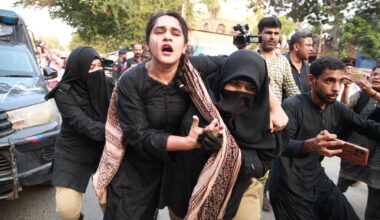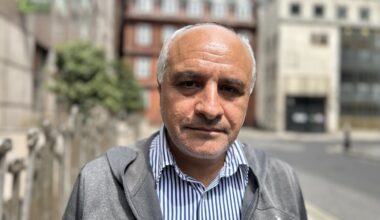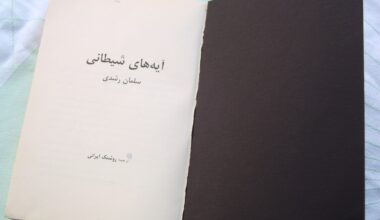This article is republished with permission from the National Secular Society website, where it first appeared on 3 June 2025.
Today, a 50-year-old man named Hamit Coskun was found guilty of a religiously aggravated public order offence for setting fire to a Quran outside the Turkish consulate in London.
Coskun’s action was political – a protest, in his words, against the “Islamist government of Erdogan, which has made Turkey a base for radical Islamists”. It was also a statement against Islam, a religion Coskun clearly has no time for.
Coskun has his reasons. He was born and raised in Turkey and is of Armenian and Kurdish descent. He and his family have suffered persecution at the hands of Islamists, including his mother’s relatives, who were among those murdered in the Armenian Genocide of 1915.
While Coskun was calmly carrying out his one-man protest, another man emerged from nearby buildings. After establishing what was happening, he informed Coskun, “I’m going to kill you.” He then left and re-emerged wielding a weapon, attacking Coskun while shouting, “Burning the Quran? It’s my religion! You don’t burn the Quran!”
The CPS used this act of violence on Coskun to justify their prosecution of him, arguing that the defendant’s actions created “a real threat to public order” evidenced by him being attacked by a weapon wielding maniac. A classic case of victim blaming.
If public order laws are being used to curtail our collective right to protest and free speech based on the subjective and unhinged reactions of others, freedom of expression is in a perilous position.
The Public Order Act gives police sweeping powers. Any conduct deemed ‘likely’ to cause someone “harassment, alarm or distress” can be punishable. This has allowed public order laws to be used as a proxy for blasphemy laws. It jeopardises freedom of expression by establishing a ‘heckler’s veto’ that incentivises violent responses to suppress views deemed offensive.
Establishing a right not to be offended sounds the death knell for free expression.
Another troubling aspect of the prosecution was its failure to draw a distinction between the target of Coskun’s protest – the religion of Islam – and the followers of Islam: Muslims. The prosecution claimed Coskun’s actions were motivated by hostility towards Muslims on the basis that he shouted “Fuck Islam” and labelled it the “religion of terrorists.”
Clearly the concept of ‘Islamophobia’ has distorted the critical distinction between prejudice or hatred directed at Muslims as individuals and robust criticism of Islam or Islamism as ideologies.
Christopher Hitchens once said the term ‘Islamophobia’ was “put into circulation to try and suggest that a foul prejudice lurks behind any misgivings about Islam’s infallible ‘message'”. The Coskun case is just the latest example of how this conflation plays out. Coskun has repeatedly made clear that his issue is not with Muslims, but radical Islam. But a few unguarded comments during a police interview were enough to convince the judge that his protest was motivated by a “deep seated hatred of Islam and its followers”.
Warnings of a return to blasphemy laws are not hyperbolic. Just last year, there was widespread revulsion when Labour backbencher Tahir Ali stood up in Parliament and called for “measures to prohibit the desecration of all religious texts and the prophets of the Abrahamic religions”.
The Government responded by ruling out any introduction of blasphemy laws. However, the troubling application of public order laws in Coskun’s case demonstrates how the UK has edged dangerously close to a prohibition on blasphemy.
Tellingly, the CPS initially charged Hamit with intent to “harass, alarm, or distress” the religious institution of Islam. This charge was only withdrawn after the National Secular Society provided the CPS with legal advice highlighting the absurdity of such an alleged non-crime.
Desecration of a Quran is a violation of Islamic law, with believers expected to treat the text with utmost respect and reverence. The initial charge perhaps reveals a mindset that appears intent on stifling contentious expression and appeasing those who are most easily offended by imposing sharia principles on protests.
The National Secular Society and the Free Speech Union funded Coskun’s legal fees and ensured proper legal representation because we recognised that a successful prosecution in this case could represent the effective criminalisation of damaging a Quran in public, edging us dangerously close to a prohibition on blasphemy.
To be clear, we don’t approve of burning books, whatever their content. But while burning a Quran in a public place may be provocative and offensive to many, it should not automatically be considered criminal. The outcome of this case represents a troubling surrender to Islamic blasphemy codes.
The burning question: are blasphemy laws back? by Stephen Evans
Kant vs Tahir Ali: why desecration should not be outlawed, by Daniel Herbert
The power of outrage, by Tehreem Azeem
Salwan Momika and the right to burn books, by Noel Yaxley
The perils of dropping a book, by Noel Yaxley
The need to rekindle irreverence for Islam in Muslim thought, by Kunwar Khuldune Shahid
The Galileo of Pakistan? Interview with Professor Sher Ali, by Ehtesham Hassan
10 years since the Charlie Hebdo attack: a message from the Freethinker, by Daniel James Sharp
Charlie Hebdo: An open letter to the free world from a freethinker, by Khadija Khan
Storm over a tea-cup? The ‘Mug-Gate’ teacher speaks out, by Matt Lovell
Image of the week: ‘Moses Getting a Back View’ (1882), by Daniel James Sharp
Britain’s blasphemy heritage, by David Nash
Secularism and the struggle for free speech, by Stephen Evans
Britain’s liberal imam: Interview with Taj Hargey, by Emma Park
The return of non-crime hate incidents: tyranny back on the march, by Noel Yaxley









1 comment
This is a disgraceful verdict. The person that attacked him was the one that should have been charged (I have not seen anything to indicate that he was). Just because someone is upset is no reason to charge someone. The person that is upset and has their feelings hurt should learn to grow up and not be allowed to dictate to others what they may do.
Your email address will not be published. Comments are subject to our Community Guidelines. Required fields are marked *
Donate